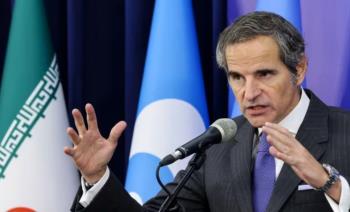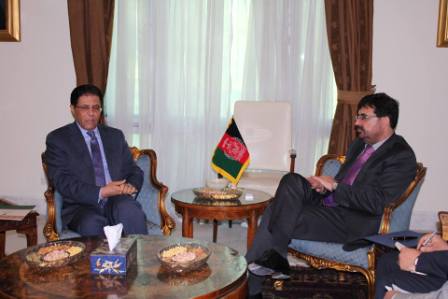Alwaght-According to the statement of press office of Afghan foreign ministry on Sunday, April 13, 2014, Zarar Ahmad Osmani, the foreign minister of Afghanistan has met Abdulrahman Al-Ghasib, Al-Saud ambassador to Kabul. He insisted on the significance of Riyadh-Kabul cooperation in order to make progress in Afghans' peace talks with Taliban and consequently strengthening stability and security in Afghanistan.
Abdulrahman Al-Ghasib also affirmed that Al-Saud would do its best to provide peace and security in Afghanistan. This claim of Al-Saud is ridiculously contradictory, because this Arabic-Wahhabi regime is the main factor of massacre of Muslims and insecurity in Islamic countries by sending Wahhabi terrorists into Islamic countries such as Syria, Iraq, Bahrain and Yemen. In addition, Saudi aims to found the largest religious center for Wahhabism in Kabul in 2014.
The process of peace talks with Taliban has been unsuccessful in recent years. According to the foreign ministry of Afghanistan, Al-Saud has new promises to give in this regard. Afghanistan ministry spokesperson, Shakib Mostaghni has described the significant role of Agha Jan Motasim as one of the main members of the Taliban in the process of peace talks in Afghanistan. He stated that Agha Jan Motasim is an afghan who has not been banned from travel to Afghanistan. The Afghan supreme peace council is connected with Agha Jan Motasim whose role in advancement of peace process in Islamic republic of Afghanistan is still important and bold.
To bring peace in Afghanistan, according to Afghan supreme peace council, supports and attempts of governments such as Al-Saud, Turkey and UAE are needed. Agha Jan Motasim, who has been under surveillance in UAE since several months ago, is the only hope of Afghanistan government to connect with Taliban armed forces.
Over the past several years, one of the measures of Afghan government particularly president Hamid Karzai was to request Al-Saud to broker peace talks with Taliban. But due to pre-conditions of Al-Saud not only no opportunity for peace in Afghanistan have been provided but also have led to empowering Taliban . It seems that Al-Saud do try to revitalize their lost past dominance over Taliban rather than extending cooperation in the process of peace in Afghanistan. Accordingly, they have attempts to be seen as a crucial player in Mideast and West Asia.
It is noteworthy that Taliban groups are militia who are supported, funded, and raised in so-called religious schools by Al-Saud. They are impressed by the thoughts such as Deobandism, Salafism, and Wahhabism. Taliban armed forces try to establish their extreme interpretation of Islam and found a so-called Islamic government. According to their opinion, serious measures should be taken against those who are against Taliban and Talibanism. Therefore, it can be claimed that Al-Saud, one of the main supporters of Taliban, are instilling Wahhabism thoughts into the Taliban forces' minds.
According to The Taliban, government in Afghanistan is not legitimate. It can be concluded that if an agreement is reached between Taliban and Government, the growth of Wahhabism and Talibanism teachings and thoughts supported and funded by Arabic countries and western countries particularly England will be possible.
It is noteworthy that the related groups to the Taliban are mostly Pakistani Pashun, Uzbeks, and Chechens or biased Arabs who have extreme ideas. They do not have any commitment to principles of peace and security of Afghanistan. In addition, they are apparatus of Al-Saud, Pakistan and Western countries to insecure Afghanistan. Due to this reason, Afghans in the one hand demand Al-Saud to broker peace talks with Taliban and on the other hand try to negotiate with Agha Jan Motasim as the representative of the moderate groups of the Taliban to cement their dominance over the peace talks with Taliban rebels.
There is not a clear-cut ending in the peace talks with the Taliban, although Al-Saud wants peace in Afghanistan and Hamid Karzai is trying to do so in last days of his political life. It is obvious that the next government of Afghanistan should behave with Taliban objectively and rationally particularly after withdrawal of foreign forces from Afghanistan. Accordingly, in the one hand, Afghans should try to attract those Taliban groups who are seeking peace, security, and cooperation in administration of Afghanistan, and act and fight harshly with those Taliban groups who are related to Al-Qaeda or the apparatus of countries such as Saudi and Pakistan, on the other hand.



























